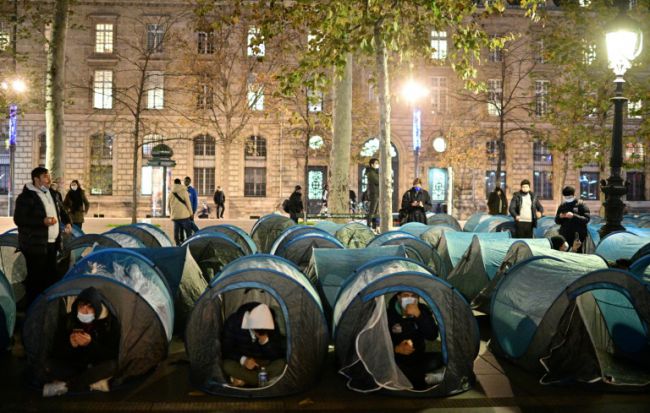Police use tear gas to disperse migrant camp in central Paris
2 min read
Volunteers had helped set up around 500 blue tents at the Place de la Republique in the heart of the French capital late Monday.
PARIS: Police used tear gas as they dismantled a new migrant camp in the centre of Paris set up to house hundreds of refugees evacuated from makeshift suburban shelters without being relocated.
Volunteers had helped set up around 500 blue tents at the Place de la Republique in the heart of the French capital late Monday, which were quickly filled by migrants, the majority from Afghanistan.
Around an hour later police arrived to dismantle the camp, picking up tents, sometimes with people still inside, to the protests of migrants and jeers from volunteers.
“They are too violent,” sobbed Shahbuddin, a 34-year-old Afghan as he put a grey beanie back on his head after being forced out of his tent.
“We just want a roof.”
Police later used tear gas to disperse the rest of the camp, driving the migrants out into the streets of central Paris.
The dismantling of the new camp comes one week after migrants were evacuated from makeshift shelters in the northern suburb of Saint-Denis without being relocated.
Ian Brossart, a deputy of the city’s mayor in charge of housing, emergency accommodation and refugee protection, slammed the “law and order response to a social situation”.
French home minister Gerald Darmanin later said images of the dismantling were “shocking” and that he had ordered the city’s police to present a report on the clearance.
Paris is a key stop-off point on the European migrant route, with tented camps repeatedly sprouting up around the city only to be torn down by the police a few months later.
Thousands have travelled from Paris to the port of Calais and attempted to stow away on trucks heading across the Channel to England. A small number attempt the crossing by boat.
The clearance comes after the French government approved an amended security law that would restrict the publication of photos or videos taken of police officers’ faces while carrying out their duties in public spaces.
Media unions say this could give police a green light to prevent journalists from doing their work and potentially documenting abuses by security forces.
“We’re here to show that we have nowhere else to go,” said Murtaza, 20, from Afghanistan before the camp was dispersed.
“We can’t live like animals, we just want to claim asylum.”






